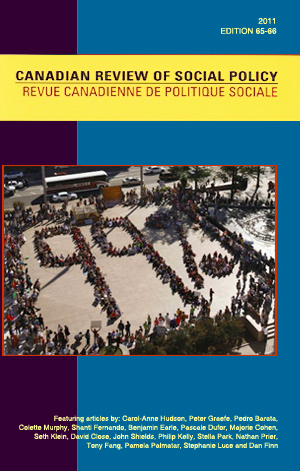Poverty Reduction in British Columbia?: How “The Best Place on Earth” Keeps People Poorest
Résumé
Using the example of B.C., this article shows how combined federal and provincial policies prevent economic growth from benefiting all but upper-income people. This article examines the unequal growth of earnings across the country, including the differences in distribution by gender. It then examines the decidedly low-wage policy the B.C. Liberal Party adopted soon after it was elected in 2001. This included a minimum wage that did not change for 10 years, a wide variety of employment standard changes that undercut both income security and decent working conditions, and privatization measures. This strategy affected the breadth of poverty among wage earners, with the majority of families in poverty having at least one person who was working in the paid labour force. The depth of poverty has been affected by deficit reduction strategies that lowered the income of those in poverty who could not work. This began with the NDP government in the late 1990s, but was accelerated by the Liberal government. The final part of this paper indicates the kind of poverty reduction plan that would begin to change B.C.’s distinction as the worst province on poverty issues in Canada. Partant de l'exemple de la Colombie-Britannique, cet article explique comment l'association des politiques fédérales et provinciales aboutit au fait que la croissance économique ne profite qu'aux personnes ayant les revenus les plus élevés. Il passe en revue la croissance inégale de la rémunération dans tout le pays, notamment les différences de répartition selon le sexe. Il étudie ensuite la politique sur les bas salaires que le Parti libéral de la Colombie-Britannique a adoptée peu après son élection en 2001. Cette politique s'est accompagnée d’une stagnation du salaire minimum pendant 10 ans, de toute une série de changements apportés aux normes d'emploi qui ont nui tant à la sécurité du revenu qu’aux conditions de travail, et de mesures de privatisation. Cette stratégie a accentué la généralisation de la pauvreté chez les salariés, la plupart des foyers pauvres comptant au moins une personne touchant un revenu d’emploi. Les stratégies de réduction du déficit ont aggravé le phénomène de la pauvreté en faisant baisser le revenu des personnes pauvres incapables de travailler. Cette tendance a été amorcée par le gouvernement NPD à la fin des années 1990, mais s'est accélérée sous le gouvernement libéral. La dernière partie de cet article présente le type de programme de réduction de la pauvreté qui pourrait aider la Colombie-Britannique à se débarrasser de son étiquette de province canadienne ayant les politiques de lutte contre la pauvreté les plus inadéquates.Publié-e
Comment citer
Numéro
Rubrique
Licence
1-The author guarantees that the manuscript is an original work not published elsewhere in print or electronically in whole or in part, except in abstract form, that the author has the full power to make this contribution, and that the manuscript contains no matter libelous or otherwise unlawful or which invades the right of privacy or which infringes any proprietary right.
2-The author guarantees that the manuscript has not been previously published in print or electronically and that if the manuscript contains any tables, figures or images fully reproduced or closely adapted from previously published material, the author must obtain the necessary permission from the author/publisher holding the original copyright prior to publication in CRSP. The author may be required to produce evidence of permission granted to CRSP’s editors.
3-As a condition of publication in CRSP, the author assigns all copyright to CRSP, including but not limited to the right to publish, republish, and otherwise distribute this manuscript in print, electronic, or other formats. As CRSP is a non-profit interdisciplinary scholarly journal, the author will receive no royalty or other monetary compensation for the assignment set forth in this agreement.
For the purpose of full disclosure, CRSP will not normally use the content provided by the author in a commercial venture, but for the purpose of disseminating the author’s content to as many readers as possible. For distribution, third parties engaging in commercial activities may be contracted to distribute the content globally, and such parties may make a profit out of the author’s content in their normal course of business. CRSP will not pay the author or reimburse the author in any form based on such commercial activities because the conduct of such commercial activities is outside the control of CRSP.
Any future reference to or use of this published material by the authors must acknowledge CRSP as the original place of publication.
PERMISSION REQUEST/ARCHIVING
Permission is given to author(s) receiving funding via Tri-Council Agencies, the Canadian Institutes of Health Research (CIHR), the Natural Sciences and Engineering Research Council of Canada (NSERC) and the Social Sciences and Humanities Research Council (SSHRC), to make their publications freely available in an Open Access repository within the stated deadline by the Tri-Council Agencies (12 months following publication). Archiving of publication must be a manuscript copy bearing none of the CRSP headers, footers or any other distinguishing marks. No links to the article on the CRSP website is permitted.
Permission requests from third parties to reproduce articles in part or full in academic/educational publications can be directed to the managing editor of CRSP, and will not be unreasonably denied.

